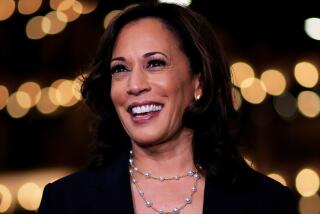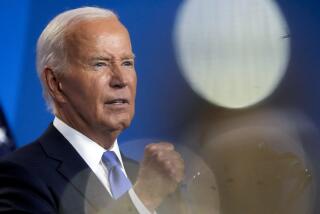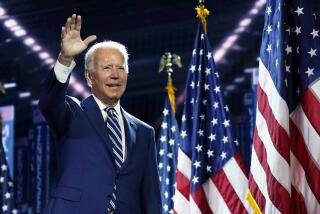Dukakis, Disputing Jackson, Calls Nomination Process Fair
- Share via
BOSTON — Gov. Michael S. Dukakis on Wednesday turned aside claims by the Rev. Jesse Jackson’s presidential campaign that the Democratic nomination process is unfair, and brusquely rejected his rival’s call for corrective action.
The request, in a letter to party leaders made public on Wednesday, had argued that Jackson should be allocated a bloc of the 647 “super delegates” to reflect his share of the popular vote. It also suggested that party rules be changed to ensure that future presidential candidates would win delegates on the basis of the popular vote they had received.
But Dukakis, asked at a Boston news conference whether he would be supportive of either measure, responded with a blunt “No.” Pressed to elaborate, he said only: “I don’t happen to agree.”
Jackson, interviewed on his plane as he flew over California, said he expected the letter to Democratic National Chairman Paul G. Kirk Jr. and others to send a message to the party.
“We want our share of delegates, that’s the message we are trying to send,” he said. “We expect the DNC (Democratic National Committee) to use its influence to be a fair arbiter in our quest for our share of delegates. . . .
“I hope the DNC will resolve all disputes amicably. I certainly hope they resolve it amicably.”
Prospect of Conflict
The exchange between the two campaigns, the latest in an increasingly tense process of signal swapping, raised anew the prospect of conflict between them at the Democratic National Convention in July.
Dukakis, the presumptive nominee, sought to quell such speculation, insisting at a news conference in the Statehouse here on Wednesday: “I don’t think we’re going to have a fight with Mr. Jackson. I think we’re going to have a good convention.”
But as Jackson and his aides have outlined increasingly ambitious descriptions in recent days of the role they expect to play in the period leading up to the convention, Dukakis and his advisers have expressed growing impatience, seeming to reject Jackson’s proposals out of hand.
And if both camps adhere to the positions they have outlined publicly, they will remain far apart on issues--allocation of delegates, reform of party rules, selection of a running mate, and the composition of the party platform--that both sides regard as of crucial importance.
Allocation of Delegates
The long-smoldering dispute over the way in which delegates are allocated remains the most divisive between them, with Jackson angry that state and national party rules have left Dukakis with 61% more delegates while his popular vote lead is only 27%. But the two campaigns are also at odds over a statement made by Jackson in Tuesday’s New York Times that for reasons of “reciprocity” he should be allowed an important role in helping to choose the Democratic running mate.
Dukakis told reporters in Springfield on Tuesday that he was “puzzled” by Jackson’s comments. “A couple of weeks ago he said the nominee should make that decision,” Dukakis said. “I agree. I think it’s up to the nominee.”
There are signs also of divisions over the makeup of the party platform after Jackson outlined in a Boston Globe interview a platform agenda that included at least two propositions--that South Africa be designated a terrorist state, and that the military budget be frozen at its current level--that Dukakis has not previously been willing to accept.
Increased Tension
Ironically, the increased tension comes just days after a personnel shake-up in the Jackson campaign that was widely welcomed by Dukakis’ advisers as likely to improve communications between the two camps.
The selection by Jackson of Ronald Brown, a former Democratic National Committee deputy chairman, and Eleanor Holmes Norton, a former U.S. civil rights commissioner, to manage his convention operations came as a relief to Dukakis’ top aides, who know well and respect the two new Jackson operatives.
The letter from Jackson’s advisers to Democratic Party leaders, a copy of which was sent to the Dukakis campaign, had asked that super delegates--a group of unpledged elected and party officials--be allocated to reflect the party vote, and that party rules be changed so that the wishes of voters be more accurately reflected in the allocation of delegates.
Dukakis, reiterating an argument he has made since Jackson began in early March to complain about delegate allocation, said Wednesday: “When you go into a race like this, in accordance with rules that provide for caucuses, primaries . . . for super delegates . . . you go into it on that basis.
Basis for Campaigning
“That’s the basis on which I went into it, that’s the basis on which I’m campaigning in it, and I would hope and expect that others would do the same.”
Of great concern, Jackson said on his plane, is the distribution of the super delegates. As of a recent count, Dukakis had 183 super delegates compared to Jackson’s 55.
“I am very concerned about that,” he said. “I appeal to them to be sensitive.”
Jackson said the letter was not sour grapes.
“We’re not seeking to change the rules,” he said. “Our position has been a consistent one--to protect the integrity of one person, one vote.”
Jackson said the “classic case of the injustice” was the Puerto Rican primary in which he received more votes than Dukakis, only to have the governor there, Rafael Hernandez Colon, pledge the 51 “uncommitted” delegates to Dukakis just prior to the New York primary.
Jackson said he was also disturbed that two former presidential contenders, Sens. Paul Simon of Illinois and Albert Gore Jr. of Tennessee, were allowed to retain their delegates by “suspending” their campaigns instead of resigning from the race.
The delegates would have been split between Jackson and Dukakis.
“That was a cute technicality,” he said. “They were defeated and when their race was over, Paul Kirk should have challenged them to give up their delegates which indeed they were supposed to do.
“When you look at the timing of the Puerto Rican vote, the timing of Simon’s dropout, the timing of Gore’s dropout, those were not only numbers but they were timely in terms of momentum.
“If I had gotten those delegates, it would have strengthened my momentum.”
Running-Mate Choice
Meanwhile, Dukakis and his aides also sought to dampen growing speculation about the candidate’s vice presidential preferences, vehemently denying that the campaign, led by Chairman Paul Brountas, had already begun the process of selecting his running mate.
“Nobody is heading my search for a running mate. The search for a running mate will not begin until the 8th of June,” the day after the nation’s last primaries, Dukakis said.
The candidate added that he would like to select his vice presidential nominee before the Democratic convention begins on July 18.
“Most nominees do, and if I’m the nominee I would hope that that decision would be made before the convention--at least the recommendation,” Dukakis said, catching himself to acknowledge that it is the convention delegates who in theory choose the vice presidential nominee.
Douglas Jehl reported from Boston and Ron Harris from Fresno.
THE DEOMOCRATIC DELEGATE COUNT 2,081 delegates needed to secure nomination Dukakis: 1,643 Jackson: 974 Uncommitted: 497 Gore: 401 Simon: 174 Others: 5 Source: Associated Press
More to Read
Get the L.A. Times Politics newsletter
Deeply reported insights into legislation, politics and policy from Sacramento, Washington and beyond. In your inbox twice per week.
You may occasionally receive promotional content from the Los Angeles Times.










